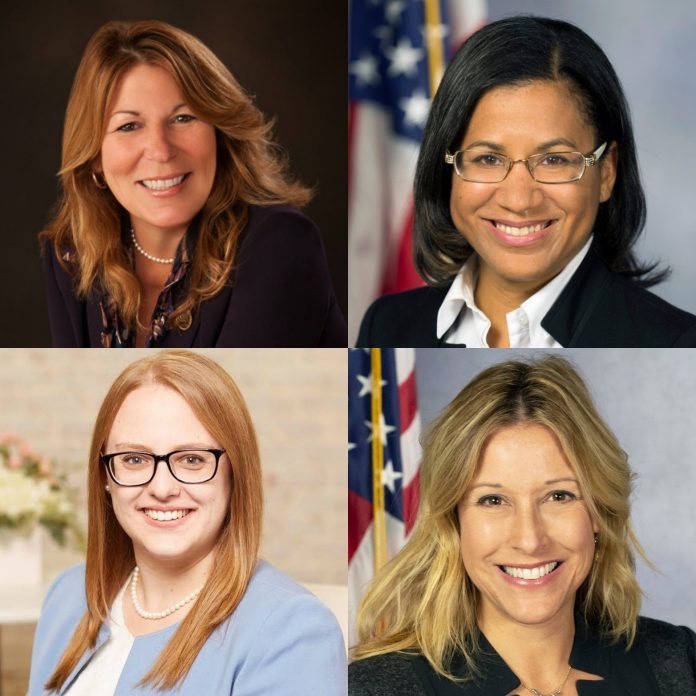Local legislators are fighting for the first change to Pennsylvania’s equal pay law in 50 years.
On March 24 – also known as Equal Pay Day – state Reps. Tina Davis (D-Bucks), Donna Bullock (D-Philadelphia), Melissa Shusterman (D-Chester/Montgomery) and Jennifer O’Mara (D-Delaware) discussed House Bill 821, which would help close the gender wage gap.
According to the Women’s Law Project, a nonprofit public interest legal organization working to defend and advance the rights of women, girls and LGBTQ+ individuals, women are paid 79 cents for every dollar a man is paid. As for Black women, they’re paid 68 cents for every dollar their white male counterpart is paid.
“One more year, and we’re still talking about the same issues,” said Bullock. “This year is even more critical as we face the challenges from COVID-19 and the pandemic, and we have read the stories about how that has impacted women in particular disproportionately.”
Bullock said women, especially women of color, worked in frontline jobs throughout the COVID-19 emergency as doctors, nurses, waitstaff, cashiers and teachers. Despite risking their lives exactly the same as male frontline workers, they received 11 to 20 percent less in their paycheck. While white male doctors earned $63.41 per hour, women earned $46.59. This disparity was even found in grocery stores, where Black women made $10.82 per hour compared to a white man’s $12.91.
“Regardless of the industry, regardless of the career, white men were making more than women of color in the same job,” said Bullock.
As stated by the Women’s Law Project, if nothing changes, women aren’t on track to earn equal pay for equal work until 2068. This is where House Bill 821 comes in.
“It seeks to increase transparency surrounding pay disparity in Pennsylvania,” said O’Mara. “Our bill would protect employees who are inquiring about wages and require employers to disclose that information. House Bill 821 would also enact new, harsher penalties on employers who use discriminatory wage practices. Our bill would hold bad actors accountable for this injustice.”
Currently, employers caught implementing discriminatory wage practices must pay a fine of a mere $50 to $200. The bill would increase this to a maximum fine of $5,000.
O’Mara reflected on how, in 2003, her father passed away and her mother, who held a high school diploma and hadn’t worked in 15 years, was forced to find a job that would sustain herself and her three children. Though she found a union position, it paid a minimum wage that was nowhere near what her late husband earned. She was unable to afford childcare. At the age of 13, O’Mara became the primary caregiver for her younger brothers, ages 10 and 2, so that her mother could go to work.
“Women make up 50 percent of the U.S. labor force and are a growing number of breadwinners for their family. Therefore, when women are not paid equally, it impacts their entire family,” said O’Mara. “If we close the gender wage gap, we can empower working mothers, especially working single mothers, to achieve financial stability and effectively provide for their children.”
Davis explained how the average income for many women is $50,000. This may seem like a good amount, but she stressed that it’s often earned by a mother of three working two or three jobs to make ends meet. A year ago, Davis said women held the majority of jobs for the first time in a decade. But since the onset of the pandemic, 400,000 women-held positions have been lost. When schools closed, many were left no choice but to leave their jobs to take care of their children.
“And for those who were given a choice, they had to be concerned about childcare,” she said. “Now, as we slowly recover, it is our responsibility – all of us listening – to help these women get back in the workforce and have them treated fairly.”
Shusterman cleared up a few misconceptions about the gender wage gap. She said many believe the gap is due to men pursuing higher education more than women, but women are also pursuing master’s and doctorate degrees.
“Also, when people say that women tend to look for lower-paying jobs, there are studies that show, when women enter a field, the annual income decreases. It was first observed in the field of psychology. It was a profession once led by men, but when additional women joined, men pursued other jobs and the annual income went down when it became female-dominated,” Shusterman said. “Wages became stagnant. The truth is, whether women are working in the service industry or the medical field, they deserve fair and equal compensation for their work.”
The goal is to introduce House Bill 821 on the House floor, and then advance it to the Senate and governor’s desk.
Samantha Bambino can be reached at [email protected]


